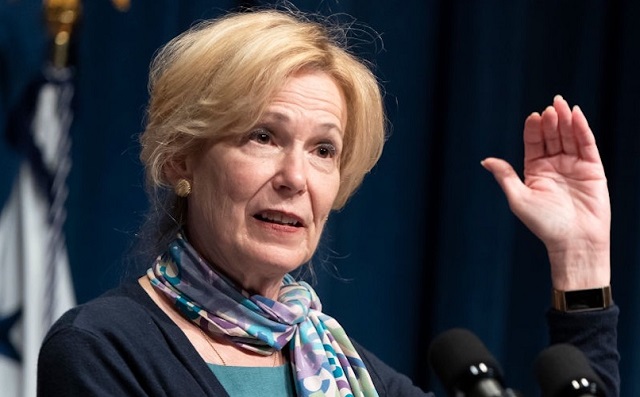Alberta
Premier Danielle Smith says federal EV mandate doesn’t work for Albertans

Federal electric vehicle mandate: Premier SmithPremier Danielle Smith issued this response to the federal zero-emission vehicle mandate: “Alberta’s government supports reducing emissions from the transportation sector and supporting Albertans who wish to drive lower-emissions vehicles. However, these efforts must be led by and support consumers and businesses, and the federal government has no legal or moral authority to tell Albertans what vehicles they can and cannot buy. “Alberta has already purchased and is working with municipalities and industry to explore the use of hydrogen-powered vehicles in our provincial transportation fleet and evaluating options to increase hydrogen fuelling stations across Alberta. We’re funding pilots that are testing long-range hydrogen trucks for industry and buses in major cities. We’re working with the same partners to improve access to EV charging stations. The federal government should rein back its failed command economy tactics and work with us on a consumer-based market approach that is achievable and doesn’t hurt people. “And yet, in another show of total disregard for the well-being of Canadians, the federal government has unilaterally imposed an unconstitutional edict with a bizarrely impossible timeline that will result in massive increases in the cost of vehicles and utility bills, vehicle rationing and wait lists, increased costs to businesses and elevated difficulty and safety risk for hundreds of thousands of Albertans and Canadians just trying to get to work and family activities in our unpredictable, and often cold, climate. “The sheer hypocrisy of this announcement is astounding. To date, the federal government’s EV approach has been a disaster. The independent federal commissioner of the environment and sustainable development found Ottawa is failing to meet its current target of making 80 per cent of the federal government’s fleet vehicles net zero by 2030. The federal commissioner found that if progress continues at the current rate, the federal government will reach only one per cent of its target by 2030. Not only are there not enough electric vehicle chargers, Ottawa doesn’t even know where EV chargers are needed. The federal government will fail to hit its target even where it has complete discretion, and yet it plans to mandate similar targets on consumers throughout all of Canada. “Although it seems rather obvious to say, emissions targets and regulations must be realistic, achievable, and cannot result in multiple severe harms to millions of Canadians. A federal government that can’t transition its own fleet to EVs should not be telling Albertans and Canadians to do what even it is unable to do. “It’s also deeply concerning that Ottawa is trying to force increased demands on the electricity grid while simultaneously weakening Alberta’s and other provinces’ grids through their federal electricity regulations. Our electric grids are not equipped to handle the massive demand surge that a forced full-scale transition to EVs would need to accommodate the delusional timelines in Ottawa’s regulations, and the federal government has not provided remotely enough financial assistance to assist provincial grids to meet this mandated electricity demand. “Further, these new regulations will result in a shortage and rationing of traditional vehicles starting in 2026 and even earlier, as millions of consumers in need of combustion engine vehicles, especially those living in smaller municipalities that commute long distances, will be unable to power or afford an EV but also won’t be able to find an appropriate vehicle to drive in their circumstances. Apparently, the federal government doesn’t understand that freezing with their families in -30 C on the side of a rural road is not an option for Albertans. “There is a way to encourage Canadians to drive more EVs, hydrogen-powered cars and other low-emission vehicles. Instead of telling Canadians how to spend their money and lining up for the right to purchase what they need, the federal government should focus on helping provinces develop infrastructure and advance technologies that are more suitable to Canada’s long distances and cold weather. “Canadians deserve more than destructive virtue-signalling regulations and unachievable targets. Unfortunately, this federal government continues to show that it is all rhetoric and no substance. This approach does not serve Canadians and it won’t protect the environment. “The Government of Alberta will do everything within its legal jurisdiction to thwart implementation of these unconstitutional regulations in our province.” |
Alberta
Pharmacist-led clinics improve access to health care: Lessons from Alberta

News release from the Montreal Economic Institute
In Canada, 35 per cent of avoidable emergency room visits could be handled by pharmacists.
Emulating Alberta’s pharmacist-led clinic model could enhance access to primary care and help avoid unnecessary emergency room visits, according to a new study from the Montreal Economic Institute.
“Pharmacists know medication better than anyone else in our health systems,” explains Krystle Wittevrongel, senior public policy analyst and Alberta project lead at the MEI. “By unlocking their full potential in prescribing and substituting medications, Alberta’s pharmacist-led clinics have helped avoid tens of thousands of unnecessary emergency room visits.”
Pharmacists in Alberta have the largest prescribing authority in the country, including the ability to prescribe schedule one drugs with special training.
Unlike in Ontario and Manitoba, Alberta pharmacists are authorized to substitute prescribed medications, which can help address issues such as adverse reactions caused by interaction with other treatments.
The study explains that this can help reduce pressure on hospitals, as prescription-related issues account for more than 10 per cent of emergency room visits.
Alberta’s first pharmacist-led clinic, in Lethbridge, sees between 14,600 and 21,900 patients per year since opening in 2022.
It is expected that there will be 103 such clinics active in the province by the end of 2024.
The researcher also links the success of the pharmacist-led clinic model in Alberta to pharmacists’ expanded scope of practice in the province.
Among other things, Alberta pharmacists are able to order and interpret lab tests, unlike their counterparts in British Columbia, Ontario, and Newfoundland and Labrador.
A 2019 peer-reviewed study found that pharmacists could handle 35 per cent of avoidable emergency room visits in Canada.
“By enabling pharmacists to play a larger role in its health system, Alberta is redirecting minor cases from emergency rooms to more appropriate facilities,” said Wittevrongel. “Just imagine how much faster things could be if pharmacists could take care of 35 per cent of the unnecessary load placed on Canada’s emergency rooms.”
The MEI study is available here.
* * *
The MEI is an independent public policy think tank with offices in Montreal and Calgary. Through its publications, media appearances, and advisory services to policy-makers, the MEI stimulates public policy debate and reforms based on sound economics and entrepreneurship.
Alberta
Province announces next step to revamped health care system

Setting the foundation for a refocused health system
Proposed legislation would support the refocusing of Alberta’s health care system to ensure Albertans get the care they need when and where they need it.
On Nov. 8, 2023, Alberta’s government announced plans for a refocused health care system to ensure patients are receiving the care they need, when and where they need it. To achieve this, Alberta’s government will be creating four new organizations, one for each priority health services sector: acute care, primary care, continuing care and mental health and addiction.
If passed, the Health Statutes Amendment Act would enable the government to take the necessary next steps to refocus the province’s health care system. The legislation would ensure Albertans have a system that works for them by prioritizing their need to find a primary care provider, receive urgent care without long waits, have access to the best continuing care options and obtain excellent mental health and addiction treatment.
“We are taking another step toward improving health care by updating legislation and enabling the governance and oversight required to refocus the health system. The critical improvements to transparency and accountability will help support the successful refocusing of the health care system to one that is responsive, effective and reflects the needs and priorities of Albertans today and for future generations.”
The Health Statutes Amendment Act will enable the transition from one regional health authority, Alberta Health Services, to an integrated system of four sector-based provincial health agencies including primary care, acute care, continuing care and mental health and addiction. The agencies will be responsible for delivering integrated health services, ensuring Albertans receive timely access to care, regardless of where they live.
The Health Statutes Amendment Act establishes roles for an oversight minister and sector minister. The Minister of Health will take on the role of oversight minister, responsible for setting the strategic direction of the overall health system. A sector minister will be responsible for a specific health services sector. For example, the sector minister for Recovery Alberta is the Minister of Mental Health and Addiction. On the recommendation of the oversight minister, additional health service sectors may be established and designate a minister responsible for that newly created sector.
Enhanced government oversight will help Alberta’s government to better direct resources to the front lines where they are needed the most, improve patient care overall and support health care professionals.
“Mental health and addiction have been growing issues within our society and need to be prioritized within our health care system. Amid an addiction crisis, a refocused health system will allow for mental health and addiction services to get the attention, oversight and focus they need. Recovery Alberta would allow for improved mental health and addiction care across the province as an important part of an integrated health system.”
“Refocusing Alberta’s healthcare system is a crucial step towards ensuring that we can deliver a framework that prioritizes accessibility, accountability, and patient-centered care. By streamlining operations, improving oversight and fostering collaboration, we are setting a strong foundation for a healthcare system that is better equipped to address the diverse needs of each of our communities.”
The legislation will enable the minister of health to transfer employees or classes of employees from AHS to the new sector-based organizations, once established. During the transition period, AHS will be enabled to continue operating as a regional health authority. Employee transfers will be seamless, maintaining existing bargaining relationships and collective agreements. This will ensure stability for the workforce, unions and government as the health system refocus is implemented. There will be no job losses for staff who transition into the new organizations.
Amendments to be made to existing legislation
The Health Statutes Amendment Act includes amendments to the Regional Health Authorities Act and the Health Information Act, which have not been updated since the 1990s.
As part of these amendments, the name of the Regional Health Authorities Act will change to the Provincial Health Agencies Act. The amended Provincial Health Agencies Act will remove outdated references to allow the transition from a single regional health authority to a unified, sector-specific provincial health system. This will clarify the scope and accountabilities of provincial health agencies and health service providers going forward.
The amendments will also place responsibility on the provincial health agencies for operational planning and oversight of clinical service delivery across the province. This will enable provincial health agencies to set priorities in the provision of health service delivery. The agencies will also be tasked with sharing information and collaborating closely to support seamless patient care as the transition to the refocused health care system takes place.
Alberta’s government is committed to ensuring that patient information continues to remain safe and secure through this transition. Amendments to the Health Information Act will be introduced to support the new health system refocus and to support the establishment of the Canadian Centre of Recovery Excellence. These amendments will allow the Ministry of Health, the Ministry of Mental Health and Addiction, the four new provincial health agencies, the Health Quality Council of Alberta and Canadian Centre of Recovery Excellence to have the authority to use health information for health system purposes.
If passed, the Health Statutes Amendment Act will enable Recovery Alberta, the mental health and addiction provincial health agency, to begin operating in the summer of 2024. The primary care, acute care and continuing care provincial health agencies are expected to be established in the fall.
Quick facts
- Consequential amendments are changes made to existing legislation due to new legislation being passed. These amendments are necessary to ensure legislative alignment with the proposed amendments to the Regional Health Authorities Act.
- To support the Regional Health Authorities Act amendments and ensure alignment, 43 other acts are being consequentially amended – for example, to replace references to “regional health authority” with “provincial health agency” where necessary.
- AHS will remain a key provider of health services, and in fall 2024 will transition to focusing on the provision of acute care services.
- Alberta’s government introduced the Canadian Centre of Recovery Excellence Act which, if passed, will establish the Canadian Centre of Recovery Excellence (CoRE) as a public agency that would support the Government of Alberta, including Mental Health and Addiction, and Recovery Alberta in advancing the Alberta Recovery Model.
Related information
- Establishing the future of Alberta health care
- Refocusing health care in Alberta
- Recovery Alberta
- Canadian Centre of Recovery Excellence
- Bill 22: Health Statutes Amendment Act, 2024
Related news
- Refocusing on patient-centred care (Nov. 8, 2023)
-

 City of Red Deer1 day ago
City of Red Deer1 day agoCity Council paving the way for more house suites, backyard suites, tiny homes, and duplexes
-

 Opinion2 days ago
Opinion2 days agoCanada’s fertility, marriage rates plummet to record lows: report
-

 Uncategorized23 hours ago
Uncategorized23 hours agoRCMP recruitment failure has Alberta advocacy group calling for Provincial Police Service
-

 Health21 hours ago
Health21 hours agoPrivate Footage Reveals Leading Medical Org’s Efforts To ‘Normalize’ Gender Ideology
-

 COVID-1910 hours ago
COVID-1910 hours agoJapan’s most senior cancer doctor: COVID shots are ‘essentially murder’
-

 COVID-192 days ago
COVID-192 days agoFormer COVID coordinator Deborah Birx now admits jabs could have injured ‘thousands’
-

 Bruce Dowbiggin2 days ago
Bruce Dowbiggin2 days agoWhy Do The Same Few Always Get The Best Sports Scoops?
-

 Health1 day ago
Health1 day agoTHE WPATH TAPES: Behind-The-Scenes Recordings Reveal What Top Gender Doctors Really Think About Sex Change Procedures






